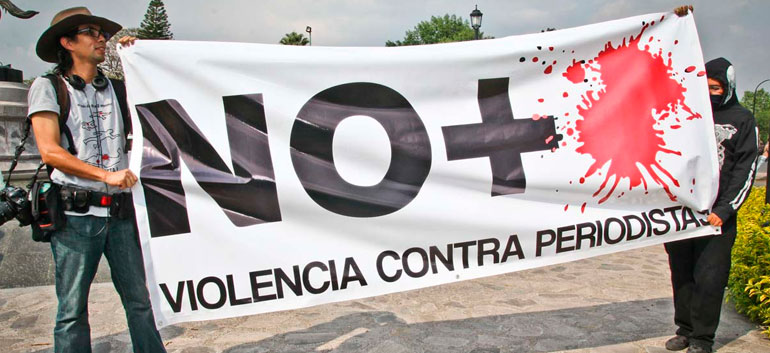Eighteen journalists in Colombia’s northern state of Antioquia are working under constant fear from death threats over their reporting on criminal gangs, national media reported on Monday.
Fear of retaliation from people working against investigations is not unusual if you are working as a journalist in Colombia’s remote areas, according to Colombia’s El Tiempo newspaper.
In the region of Bajo Cauca, Antioquia, which consists of six municipalities, 18 journalists are working at risk, according to Oscar Morales, a representative of the Association of Journalists of Antioquia (APA).
El Tiempo reports that in Bajo Cuaca, three in nine journalists carry out their work in fear.
Morales, who has been pleading for the protection of journalists since the murder of radio presenter Luis Carlos Cervantes on Tuesday, confirmed that many journalists are being affected by their fear of retaliation.
“There are many colleagues in remote areas of the department [state] where auto-censorship reigns. These journalists often fear that their problems increase if they let themselves be known,” said the APA representative.
Morales added that of the 18 journalists at risk, only four are under the protection of Colombia’s National Protection Unit (UNP).
The recently slain Cervantes was killed when he was picking up his son from school. He had received threats going back to 2010, but the UNP had called-off his protection scheme less than three weeks before he was gunned down.
MORE: Colombia journalist gunned down after years of death threats
Threats do not expire
Few journalists are under the UNP’s protection, and newspaper El Espectador named at least eight threatened journalists in Bajo Cauca, including the head of the La Verdad del Pueblo de Caucasia newspaper, Leiderman Ortiz.
“Threats do not expire because one ceases to be a journalist. The only way that threats expire is when the criminal gangs cease to exist in Bajo Cauca,” said Ortiz.
Through the Inter-American Commission of Human Rights, Ortiz managed to coerce the Colombian government to grant him UNP protection because of the threats he received, according to El Tiempo.
Criminal gangs had put a bounty on Ortiz’s head after he denounced several leaders of criminal organizations such as Los Urabeños, Los Paisas, and Los Rastrojos.
Two grenade attacks and three assassination attempts have been registered against Ortiz since 2008.
Intensified hunt for criminals
Colombia’s Defense Minister Juan Carlos Pinzon announced on Monday rewards for people in Bajo Cuaca who would deliver information leading to the capture of wanted criminals in the region.
The rewards are part of “Operation Bajo Cauca Trojan,” which is a joint effort between local and national government to challenge and fight crime in the region. In addition to special forces from the military, 358 members of Colombia’s National Police will be deployed in the area to provide security, according to El Colombiano newspaper.
Sources
- Ocho periodistas han sido amenazados por bandas criminales en el Bajo Cauca (El Espectador)
- Bajo Cauca, ‘zona roja’ para los periodistas (El Tiempo)
- Gobierno pone precio a criminales del Bajo Cauca (El Colombiano)


